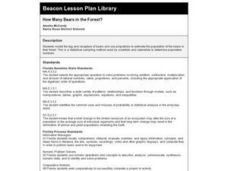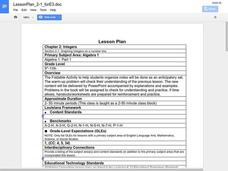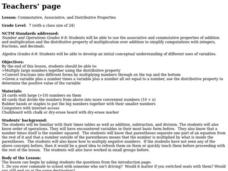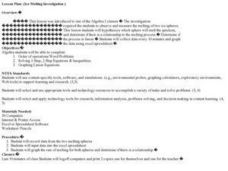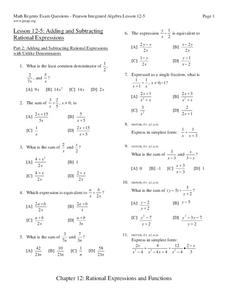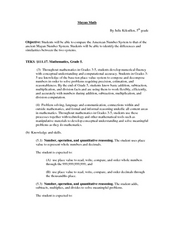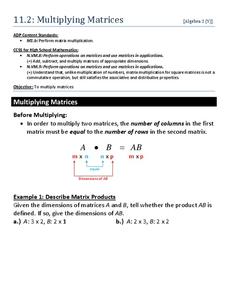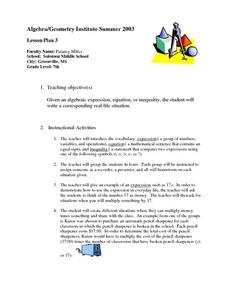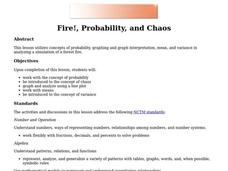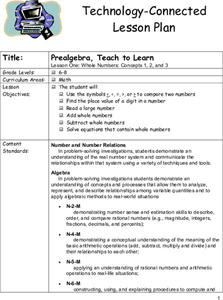California Education Partners
Least and Greatest
Squares can be magic. Pupils use their knowledge of addition of positive and negative rational numbers to create a 3 X 3 magic square where the sums are 1. Scholars create addition and multiplication expressions with a set of rational...
California Education Partners
Miguel's Milkshakes
Moooove over, there's a better deal over there! The fourth segment in a series of eight requires individuals to determine the best unit cost for milk. Scholars calculate the least amount they can spend on a particular quantity of milk....
California Education Partners
Summer Olympics
Quickly get to the decimal point. The last assessment in a nine-part series requires scholars to work with decimals. Pupils compare the race times of several athletes and calculate how much they have improved over time. During the second...
California Education Partners
Colorful Data
Scale up your lessons with a performance task. Young data analysts work through an assessment task on scaled bar graphs. They answer questions about a given scaled bar graph on favorite colors, analyze a bar graph to see if it matches...
Curated OER
Million Dollar Gift
Third graders create a box big enough to hold a million dollars. This is a project fun to do near the winter holidays with inexpensive gifts included in the boxes. This hands-on lesson very effectively demonstrates the concept of volume.
Curated OER
How Many Bears in the Forest?
Third graders model the tag and recapture of bears and use proportions to estimate the population of the bears in their forest. This is a statistical sampling method used by scientists and naturalists to determine population numbers.
Curated OER
Two-Step Equations
Sixth graders work through a two-step equation with their teacher. After reviewing one-step equations, they complete a worksheet using tiles and colored pencils to complete two-step equations. To end the lesson, they write out the step...
Curated OER
The 3R's: Rights, Rules, and Responsibilities
Eighth graders complete seven work stations that highlight math activities while they focus on the rules for Internet use and classroom rules for working in cooperative groups. After completing the activities, they complete a self-...
Curated OER
Integrating Functions
In this math activity, students find the answers to the functions that includes integration and trigonometry. They use the examples for help with the special functions.
Curated OER
Integers
Students graph integers on a number line. In this integers lesson, students create a colored foldable to assist them with notetaking and problem solving. Students complete exercises from text.
Curated OER
Negative Exponents and Scientific Notation
In this exponent rules worksheet, students simplify 56 negative exponents and scientific notation problems. Students use exponent rules to simplify each problem.
Curated OER
Commutative, Associative, and Distributive Properties
Students explore the concept of the associative, commutative, and distributive properties. In the associative, commutative, and distributive properties lesson, students discuss real world examples of each property. Students demonstrate...
Curated OER
Ice Melting Investigation
Learners conduct an ice melting investigation in which they observe and measure the melting of two ice spheres. They develop a hypothesis as to which sphere will melt the fastest, collect data every ten minutes, and graph the data using...
Curated OER
Rational Expressions: Add and Subtract
In this rational expression worksheet, students add or subtract rational expressions by finding common denominators. There are 11 multiple choice questions.
Curated OER
End of the Year Math Terms
In this end of the year math test instructional activity, 4th graders complete problems including addition, division, measurement, decimals, and more. Students complete 22 problems.
Curated OER
Mayan Math
Fifth graders investigate the Maya's as mathematicians. In this Mayan math lessons, 5th graders work with the ancient Mayan numbering system by comparing it to the American Number System. They tell the differences and similarities...
Utah Education Network (UEN)
Pattern Search
Pupils identify and define various mathematical properties, such as the commutative properties of addition and multiplication, and the associative property of addition. They also reason and communicate mathematically by making...
Curated OER
Multiplying Matrices
Go over the basics of matrix multiplication, from checking the dimension of the factors, to applying the distributive property. This activity includes directions on when and how to multiply matrices, one example, and a few problems your...
Curated OER
Real Life Situations
Pupils investigate different equations and think critically how they could represent a real-life situation. They should write a word problem to coincide with the given equations. The lesson requires students to use critical thinking skills.
Curated OER
Fire!, Probability, and Chaos
Upper elementary and middle schoolers work with the concept of probability. They are introduced to the concept of chaos. Learners graph and analyze using a line plot, work with mean, and are introduced to the concept of variance.
Curated OER
The World's Simplest Cartesian Diver
Have your class learn about buoyancy using this simple lesson. First, they bring in condiment packets and see what happens when they place it in a glass of water. Then, they use one of the packets to illustrate the concept of a Cartesian...
Curated OER
Whole Numbers
Student are assigned one of the sections on whole numbers. After reviewing the content, they teach their assigned sections to other class mates. They publish their findings on a PowerPoint slide show to use when they teach their section.
Curated OER
Subtracting Monomials and Polynomials
Students subtract monomials and polynomials by combining like terms. In this advanced subtraction lesson, students define the rules and properties for subtraction of polynomials. They apply the rules for addition to help with the rules...
Curated OER
Four Fours Challenge
Second graders look at the number patterns created when tins are stacked in different arrangements. The aim of the unit is for students to keep track of the numbers involved by drawing up a table of values. They are then encouraged to...







